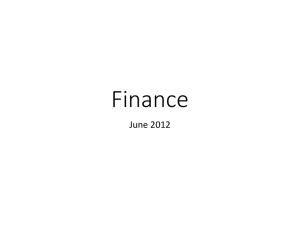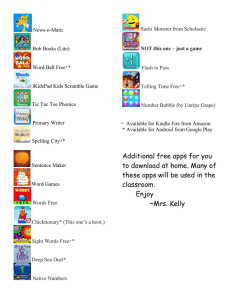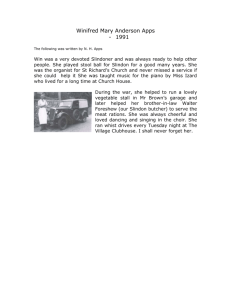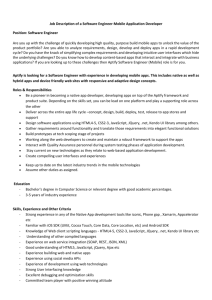The Student/Library Collaborative: Toward Transformative Mobile Library Service
advertisement
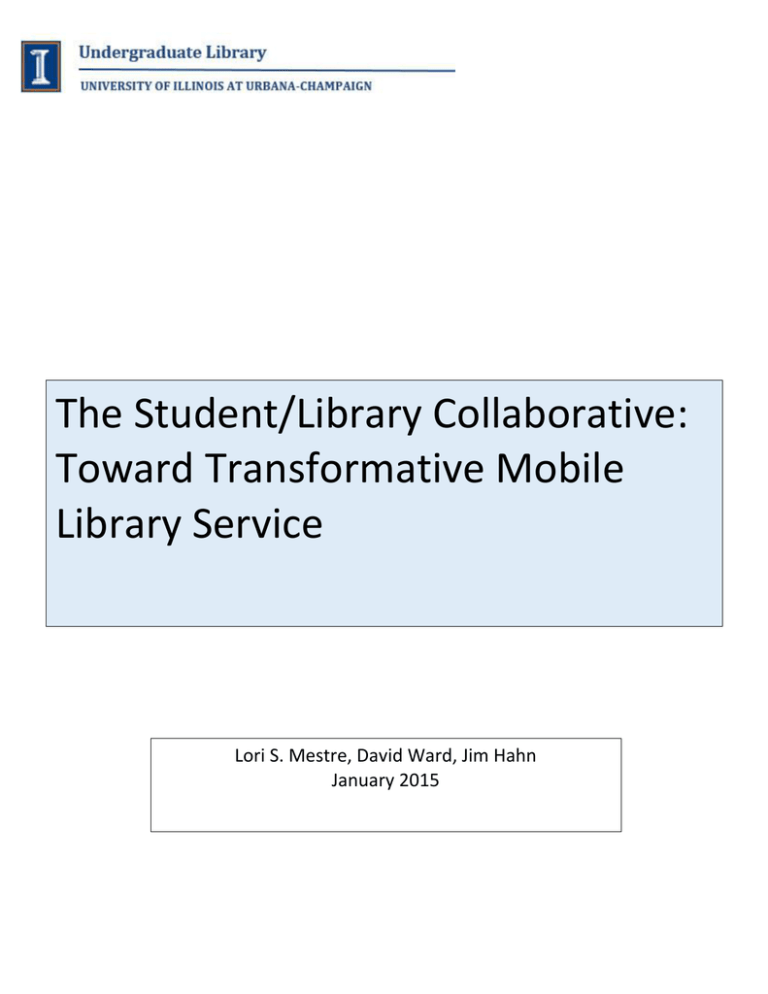
The Student/Library Collaborative: Toward Transformative Mobile Library Service Lori S. Mestre, David Ward, Jim Hahn January 2015 LG-07-11-0339-11 Title The Student/Library Collaborative: Toward Transformative Mobile Library Service Description of Project Partners There were no Partners identified in the proposal for the Grant. However, in order to accomplish the goals of the grant, various campus and external partnerships were established, including a strong collaboration with the Department of Computer Science, and the Association for Computing Machinery (ACM) chapter (for student project work) at the University of Illinois at Urbana-Champaign and the following CARLI libraries. Booth Library at Eastern Illinois University Heartland Community College Library Milner Library at Illinois State University Staley Library at Millikin University William Rainey Harper College Library Overview This grant addressed two challenges in library mobile application software design: identifying student location-specific needs, and creating a collaborative model for integrating student input into library software design from the point of conception. The grant tested three methods for student input – an app-design competition, a coding camp, and a series of collaborations with Undergraduate Computer Science courses. Primary grant outcomes included the development of new software, including extensive developments on MINRVA (minrvaproject.org/), a mobile library application, and iWonder, a new library chat software. The grant also resulted in an understanding of how different methods for student involvement in mobile design (competitions, coding camps, classes) produced unique and complementary outcomes for the design process. This report includes detailed information on each method employed, advice on matching methods to desired outcomes (e.g. idea generation vs code generation), and recommendations on implementing the methodologies developed by this grant at local institutions. Activities Completed During the Project: The website at http://www.library.illinois.edu/nlg_student_apps provides details of the activities of the project, including a student competition for designing mobile applications, a coding camp for developing mobile applications, student involvement from four computer science classes for creating mobile applications, usability studies for apps under development, collaboration with various CARLI libraries to configure apps for their institutions and the development of 12 code modules. It also provides the conference presentations and publications that report on the grant activities and results. 1 LG-07-11-0339-11 Project Results: The main purpose of this grant was to coordinate a two-year student collaboration program to co-design mobile applications with students that provide location-based services to assist users in finding and locating library resources, collections, and services. This collaborative program documented best practices for working with student design teams, as well as lessons learned and the benefits of student mentoring. The next section details results from the various activities. Student Mobile App Design Competition We successfully hosted a Student Mobile App Design Competition in February 2013. A total of 27 students, participated, forming 6 teams. Each team produced a design and mock-up for a mobile application to improve their use of library resources and services. Our team later developed several of the designs into apps. Highlights of the competition included: Designed contest rules and student information packets, based on a similar case study competition in the School of Business. Developed a license agreement with Campus Legal and the Office of Technology Management. This agreement was vital to making the ideas and applications resulting from the competition available for further development and sharing with the general library mobile development community. Posted a blog on the IMLS site related to the competition (available at: http://blog.imls.gov/?p=3499). The Fall CS 492 worked on the “Study Buddy” application proposed by one the February 2013 competition teams. The application was completed at the end of the spring 2014 semester. Findings: Mobile App Design Competitions are an excellent method for idea generation and insights into user needs and desires for location-specific library information. Presenting competitions in a formal atmosphere, with a detailed entry procedure, regular organizer check-ins, and a formal final presentation with a panel of judges, helped keep students on track and focused on creating creative, high quality work Coding Camp In Fall 2013, we organized a Coding Camp, in which students spent a weekend working with grant personnel on coding mobile apps for library use, based on their own ideas as well as suggestions from the Student Competition A total of 10 participants were chosen, and 6 showed up for the camp. Participants divided into 2 teams, and generated code for 2 mobile apps, both based on location aware services and APIs/data feeds from the library and/or campus. The coding camp allowed us to investigate how students with computer programming skills improve or extend existing software used for mobile devices 2 LG-07-11-0339-11 and applications in a library setting, and also to focus on developing a methodology for designing and creating mobile applications in collaboration with undergraduate students. It allowed us to discover best practices for collaborative mobile application development, as well as to identify student needs and interests for future mobile application development. The work that students developed helped us design templates and procedures that can be used for future mobile application development by both students and librarians. Articles describing the process, results and suggestions for the Student Mobile App Design Competition and the Library Mobile App Coding Camp were published for the benefit of other librarians. Findings: Coding camps should be highly specialized and focused on tackling a specific known user need Attendees should have a prep session prior to the camp to learn library APIs and ask questions about the structure and organization of library data Additional ideas for new apps can results from student interactions with library APIs Computer Science Classes The classes that worked with us to develop mobile location-aware applications for the grant were CS 492 (Fall 2012 / Spring 2013), CS 428 (Spring 2013), CS 492/493 (Fall 2013 / Spring 2014). In addition to benefiting our purposes, the projects were designed to involve students in “real world” software development projects. Highlights of this collaboration include: 12 code modules have been prototyped (6 for Android and the same 6 for iOS) to support the students’ work and app concepts 12 web services based on these modules have been deployed to support student prototypes. The web services provide data to the corresponding app modules. For example, the Citation web service provides data to the Citation Module. There are four new Study Buddy modules (an idea from the Student Competition) that support the Fall computer science course of searching for a course, adding a course, registering a study group for a selected course on campus, managing the length of time for the study session. There is also a registration web service which re-uses the VuFind catalog login to authenticate the user is affiliated with the University of Illinois campus. a Universal iOS (iPad, iPhone, iPod touch, etc.) modular infrastructure + 5 modules approved by iTunes Store that can be used as a base for many other Apps that can be modified by Libraries. A computer science class in Spring 2013 (CS 428 - Senior software engineering) worked with the grant team to develop improved access to the library’s online “Ask a Librarian” synchronous chat service. The “i-Wonder” open-source chat service has been active at the Library since January 2014 and is available to other libraries. 3 LG-07-11-0339-11 The partnership with computer science classes has involved 14 students. The collaboration included 3 students from Fall 2012/Spring 2013 CS 492, 3 students from Fall 2013/Spring 2014 CS 492, and 8 from Spring 2013 CS 428. Code for the “iWonder” Ask a Librarian chat application is planned for future release under the NSCA open source license, furthering the goal of supporting libraries nationally as a with software outputs co-designed by students and grant staff. Findings: Formalized interactions with Computer Science classes and instructors can yield usable code for future library software development Student input into software design early in the planning phases has good potential for results in software offerings by libraries that are useful and used by students. Code that students produce does need to be vetted and cleaned up by professional software staff to meet quality standards and security requirements. In general, other libraries may be interested in experimenting with student sourced senior projects as a way to advance their software services, especially if there isn't a robust internal software development. Computer science students are valuable partners for their diverse perspectives on what libraries can become in the future. Students typically respond well to high expectations and challenging work. Students ought not be expected to produce professional code, but with the right mix of mentoring and defined and scoped projects, student code outputs can be scaled to meet other technical software needs in library and campus settings, as we have shown with the release of Minrva 2.0 for the library consortium in Illinois. Project Impact The validity of the student app competition, coding camp and collaboration with students in computer science courses rests in the value of working with students to design and create apps that are relevant to their needs. As a result of the activities, the grant team is able to respond positively to one of our initial questions of: “What is the validity of the competition methodology for generating useful ideas for mobile apps and knowledge of student learning space use?” The competition yielded nearly twenty ideas for apps that the Library could develop based on student needs. Students also developed designs in ways that were unique, intuitive, functional, and that often diverged from what library personnel might produce. Another reason for the initial question was to ascertain whether or not this type of competition could be repeated to continue to get fresh ideas from students and if it is cost effective. When analyzing costs, ($2,000 for prizes, promotion, and food) it was determined that the benefit of student interaction and contributions was well worth the cost. The ideas, rationale and conversations with the students about design and apps is critical to know and periodic events, such as this competition, can help libraries in their efforts to provide the most relevant services, facilities, and collections. 4 LG-07-11-0339-11 Although internal resources (coders and IT staff) might be used in libraries to develop ideas that have been generated for software or apps, one of the main purposes of the grant was to explore other ways to provide student input and development. The other two student collaborative approaches explored by the grant team furthered the work of the ideas generated from the competition and can be replicated by other libraries. The computer science classes teams took the ideas generated by the competition and produced functioning, production-ready apps. The “Coding Camp” methodology, allowed student teams to develop code over a weekend that was focused on a limited number of specific app ideas and sets of functionality. Researcher observations and feedback from students, both during the camp and in individual interviews afterwards, led to several insights about what sorts of outcomes libraries might anticipate from running camps, how to best structure library coding camps, what outcomes students anticipate from participating in a sponsored camp environment, and what features and preferences students have for mobile apps designed to support their academic endeavors. The research team felt that the camp was useful to their ongoing mobile app development process, partially for the code generated but primarily for the direct feedback on what types of apps students wanted to see. The start-up time and costs for the project were low, as expected, and the insights into student mobile preferences seemed proportionate to this outlay. The camp method should be reproducible in a variety of library environments. The key assets other libraries will need to have in place to run a camp include staff with knowledge of client-side API use (in particular jQuery, CORS, or related skills), and knowledge of campus data sources that students may wish to pull from. Third-party APIs with bibliographic data (e.g., Good Reads) could also be used as placeholders for libraries that do not have access to APIs for their own catalogs or discovery systems. Through two years of sustained partnership with computer science course projects, our grant team uncovered a number of key factors to success in developing useful and used outputs of these partnerships. Computer science senior projects are able assist in technical coding projects for which requirements have been scoped and needs have been shown, although technical expertise will vary. Code cleanup is necessary for integration of the student projects into any sort of production code that the library may want to use – this is crucial for security purposes and system stability overall. Students respond well to a challenging problem, but at the same time the library has to provide technical support in meeting those challenges, one that borders mentoring and teaching software engineering best practices. The campus Office of Technology and Campus legal is critical to help understand the licensing and code rights necessary for making the code open source and available to the rest of the library community. There needs to be a lot of lead time in working with students, whether it is for getting institutional board approval, licensing approval, soliciting students or working with classes. 5 LG-07-11-0339-11 The goal for the researchers was to determine if this combination of methodologies would allow libraries (and other campus mobile developers) to involve students across the full timeline of mobile app development, from conception and feature development through actual coding of a finished product. The conclusion is that these collaborative approaches provide great opportunities for librarians to develop student connections to help with the design and production of mobile applications and software. All approaches involve a commitment of librarian time to set up and monitor progress. There is minimal cost involved if doing a competition, coding camp, or working with students in established courses. Students in all three approaches were generally content with gaining the experience, rather than any monetary reward. It gave them a valuable resumebuilding opportunity to develop and design a business solution, and to deliver a formal presentation to a real-world client. This study has shown that a collaborative process in technology design can yield insights into students’ conceptual models about how spaces, resources, and services can be implemented. While the traditional model of service development often leaves these considerations until the very end in a summative assessment of service, the collaborative methods presented here provide librarians a new tool for adding depth to service design and implementation, ultimately resulting in services and platforms that are informed by a more well-rounded and deeper understanding of the student mobile-use experience. In practice at the Illinois site, we were able to advance the state of the art in areas of digital mobile service design, which took a student centered approach to application development. What’s Next? One of the PIs on the project will continue efforts to collaborate with computer science classes to design, develop and test student suggested apps to help with library services. He will continue promoting the apps through the CARLI i-Share libraries and serve as a resource for other libraries who wish to use any of the apps. The CARLI consortium is considering adopting Minrva as the de facto mobile app for the state, and negotiations over how to support the technical infrastructure at CARLI for the 80 or so libraries is ongoing. The IWonder chat system developed in the grant does support production virtual chat needs at the University of Illinois. There is a small reoccurring fund in the Library to pay for student programmers who are stabilizing the chat system, adding features, with the aim of packaging the system for availability in the open source. The IWonder system is general enough that when placed into the open source on Github, it could be utilized by organizations outside of the library, and could pick up additional collaborators from outside of the University of Illinois system and even collaborators from start-ups or other industries that need to offer real-time support by chat programs. As the grant cycle ends and the work of student programmers is slated for mainstreamed projects in the University of Illinois Library, researchers have found that by aligning with other project focused IT teams in the library, integrating student developer outputs is feasible on a continuing basis. The library has integrated student developer code within 6 LG-07-11-0339-11 their agile development processes as they undertake a library web presence redesign. The main library website utilizes a number of APIs which students and grant staff developed. The APIs developed in the process of native mobile app coding are useful for other systems, since APIs can drive web applications and native application alike. Since the visiting professional staff who supported student collaborations during the grant are not continuing with the library, some of the technical support such as code cleanup and testing will be done in partnership with production IT staff in the Library Software Development Group. At this time there are multiple projects underway in which Library IT staff support student programmers as they meet the high standard of quality assurance and code maintenance. The competition methodology itself was considered successful by the grant team, primarily as a way to discover and understand student mobile needs for organizing and presenting library and related campus information. One conclusion that was reached was that the competition really only needs to be run every two to three years, with a development phase following it to produce, test, and put actual apps into production. For the coding camp, for the next camp twice the number of desired participants will be invited to ensure both a variety of coding skills and interests as well as opportunities for more teams to be formed. Additionally, partnerships with student coding groups or related classes should help to drive up attendance. The biggest difficulty moving forward will be developing campus standards for data that can be made available to students about resources, spaces, and services. As noted above, students typically do not design a “library app,” rather they look to build a “student app” that pulls in a variety of data from across campus. Functions of apps are therefore more oriented toward common student activities like studying, socializing, and learning. A related challenge will be to provide adequate format and delivery mechanisms for access to supporting data feeds. A key next step resulting from this research is to work towards the coordination of information about learning spaces at a campus-wide level. This is a large endeavor, and requires consolidating the data feeds into a common format for retrieval and display on mobile devices, identifying the common features about spaces that students want to know, and ensuring that this data is collected in a comparable way. Outputs of the project courses will be shared nationally, with much of the code becoming open source and available by the end of the grant cycle. Grant Products Design ideas from the Student Competition yielded several Apps that the team later developed. The team used the existing Minrva infrastructure to create modules based on the student ideas. Documentation was created of best practices, including documents for consulting with faculty and courses for student involvement in App development. These are available at the Web page[http://www.library.illinois.edu/nlg_student_apps] with documentation for Grant summary, proposal, reports, outcomes 7 LG-07-11-0339-11 Conference presentations Student mobile app competition documentation Code camp documentation Documentation for IRB approval, documents for licensing approval and documentation (16 pages) for App development. Available at: http://www.library.illinois.edu/nlg_student_apps/supporting_documents/index. html o The code infrastructure for modules, the iOS modular framework for the iOS modules will allow libraries to use the infrastructure and modify/customize it according to their needs. (https://play.google.com/store/apps/details?id=edu.illinois.ugl.minrva ) o The Minrva 2.0 for Android supports location specific modules available to all CARLI I-Share libraries http://minrvaproject.org/catalog.php). Specifically, any I-Share library in Illinois can use Minrva 2.0 for Android as the Native mobile app to search their VuFind catalog. In addition to catalog search the Minrva Core includes the following modules available throughout Illinois: Blocks, Checked Out items, Citation module, Course Reserves, Favorites, Question Board, Requested Items, and Study Buddy Marketing & Promotional material (Flyers, posters) are available here: http://minrvaproject.org/librarians.php Publications: Hahn, J. (2015). The student/library collaborative: senior undergraduate computer science course projects at the University of Illinois library. portal: Libraries and the Academy (15) 2. Ward, D., Hahn, J., Mestre, L.S. (2014). Designing mobile technology to enhance library space use: findings from an undergraduate student competition. Journal of Learning Spaces 3 (2). Ward, D., Hahn, J. Mestre, L. (2014). Adventure code camp: library mobile design in the backcountry. Information Technology and Libraries 33 (3):45-52. 8
